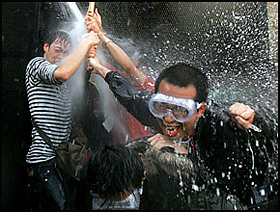 |
 |
 |
 News from Around the Americas | December 2005 News from Around the Americas | December 2005  
Protesters Try to Storm WTO Talks
 Sam Cage - Associated Press Sam Cage - Associated Press


| | Anti-globalization protesters clash with riot police during a demonstration against the WTO meeting. (AFP/Getty) |
Hong Kong - Hundreds of protesters wielding bamboo sticks broke through police lines Saturday and tried to storm the convention center hosting global trade talks, but security forces scattered the crowd with tear gas. Police said 41 people were injured and 900 were detained.

Police Commissioner Dick Lee said the injured included five police officers. Two people were hospitalized. Police were determining whether to formally arrest those detained.

"If necessary, we will make arrests. We will not let them go easily," he said.

The demonstrations were the most violent during the weeklong meeting of the World Trade Organization.

Security forces spent much of the afternoon fighting running street battles with protesters, including South Korean farmers, Southeast Asian groups and activists from Europe and America. The demonstrators oppose the WTO's efforts to open up global markets.

Protesters hit police with bamboo sticks and used a metal barrier to ram a line of officers armed with riot shields. The police fought back with clubs, pepper spray and water cannons that shot a chemical mixture that burned the skin and eyes.

The clash occurred just minutes after Secretary for Security Ambrose Lee went on television and warned the public to stay away from the area.

"The police will take robust action to dispel these illegal and violent actions," Lee warned.

The six-day meeting concludes Sunday, and delegates were seeking to agree on a final statement showing at least modest progress toward lowering trade barriers in agriculture, manufacturing and services.

A draft agreement circulating Saturday indicated negotiators failed to tackle the toughest issues. While it showed some progress in a few areas, it also was riddled with loopholes and gaps that might be hard to close with little time left.

One of the most contentious issues was setting a deadline for ending government payments to domestic producers to promote exports, a key demand of poorer nations. The draft suggested that such export subsidies be eliminated by 2010 a date that will likely meet opposition from the European Union.

A dispute over how much wealthy nations should cut their tariffs and farm subsidies has been a major obstacle during the meeting, with many delegates pinning the blame on the European Union's refusal to further open up its farming market to imports. The EU, however, says it has made ambitious offers to cut its trade barriers and wants developing nations to agree to lowering their tariffs on manufactured goods and services.

EU trade chief Peter Mandelson said the draft "lacks balance" but he will continue to negotiate, including on the sensitive topic of export subsidies.

In a victory for West African cotton growers, the draft calls for rich nations to end export subsidies for cotton in 2006. This represents a U.S. concession to demands by African and other developing countries that say government support for farmers in rich countries is driving many poor farmers out of work.

The text also showed progress on the issue of granting duty-free and quota-free access for goods from the world's poorest countries, suggesting that all developed nations would agree to the proposal.

U.S. Trade Representative Rob Portman said he did not expect any big breakthroughs, but he was hopeful for some modest progress, including an agreement on an end date for export subsidies.

"The U.S. had hoped for more in Hong Kong, but we came here with relatively low expectations because of the inability to resolve the agriculture issues," he said. "I'm still relatively hopeful."

The goal of the Hong Kong meeting was to produce a detailed outline for a binding global free trade agreement by the end of 2006. But the six-day meeting appeared doomed even before it began due to the impasse over agricultural trade.

From the start, delegates began floating the idea of a follow-up ministerial meeting in March or April, assuming there was little chance for a breakthrough.

A failure in Hong Kong could seriously undermine the WTO's credibility. Previous trade-liberalization talks in Cancun, Mexico, in 2003 and Seattle in 1999 collapsed in disarray.

The current Doha round of talks, started in 2001 in Qatar's capital, already is two years behind schedule. | 
 | |
 |



